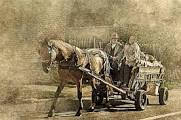A Murder in Harlan: Part II
Published 5:37 pm Thursday, October 6, 2022

- An illustration of the Loebs on their horse and wagon. Illustration submitted
JADON GIBSON
Contributing columnist
Julia Loeb was counting coins and her husband Gus Loeb puffed on a corncob pipe as their horse plugged along toward the end of another long day. They looked forward to getting back home and to supper which Julia started early that morning. Gus planned to work a couple hours in the garden before going to bed. The elderly Loebs normally went to bed at nightfall and got up with the rising sun. Many people did likewise in that era.
Buford Overton had been waiting for them to come by. He had bad intentions.
As the old folks approached he sent a barrage of bullets at the defenseless Loebs. Julia was knocked from the wagon and Gus slumped to the floor. Their startled horse took off with the wagon bouncing precariously behind. It was found later by area residents with Gus Loeb lying dead inside.
Meanwhile Buford walked to where Julia had fallen on the edge of the dusty road. Her head and right arm were thrashing from side to side but that didn’t concern Buford. He grabbed the cloth she had clutched in her hand with the coins received from selling that day. He picked up others that had been scattered on the ground nearby. He then left leaving Julia Loeb to die along the hot, dusty road.
Buford Overton was arrested the following day and tried for the murder of Gus and Julia Loeb by a Harlan County, Kentucky jury in 1895. W. F. Hall was the presiding judge. Overton was found guilty and sentenced to death by hanging.
Surprisingly before his day of reckoning he found and took an opportunity to escape.
He immediately began his trek back to Hancock County in Tennessee carrying a rifle that he picked up as he left the old Harlan jail. While traveling through the woods he saw a man coming toward him with a rifle and two dead squirrels.
Buford decided he would have to shoot the man but he veered off, vanishing into the trees and bushes.
The man was Enos “Bear” Hensley, a former Harlan County sheriff who hightailed it to town and notified the new sheriff. Deputies and special deputies were sent to bring Overton back. They recaptured the escapee because he was outmanned. Once he was back in the old Harlan jail he saw former sheriff “Bear” Hensley who he had seen earlier in the woods.
“You’re a lucky man,” Buford told him. “If you had come up any closer I would have had to kill you.”
Overton’s lawyer filed to have the sentence commuted to life imprisonment but Governor Bradley refused. The hanging was set for Monday, October 18, 1896. The closer it got to the date of execution the more nervous Buford became. He was able to deal out death and misery but certainly didn’t want to experience it.
Visitors began arriving at the site of Buford’s hanging the day before. The roads leading into Harlan Town were bustling with travelers from Tennessee, Virginia and several east Kentucky counties. Hangings always drew large crowds. Rain began falling early the next morning and continued for several hours. The steady downpour caused numerous wagons to bog down, slowing the arrival of travelers.
There was a stir when someone slipped Buford a knife. He refused to give it up saying he would kill himself before giving it up.
“I reckon you can do that,” Sheriff Grant Smith told him. “There’s nothing I can do about it if you prefer to bleed to death. But if you don’t, then my duty is to carry out the order of the court. That order says you will be hanged today. I’m not gonna’ see any of my deputies knifed so if you don’t turn over that knife I’ll have to shoot you.”
Buford determined that he had no strategic advantage and gave up the knife.
Although he ate a large breakfast he didn’t have an appetite at noontime as his scheduled hanging neared. He spoke quietly with Rev. Browning of Harlan and Rev. Noble Burkhart of Lee County while the rain continued to fall outside.
The sun broke through the clouds at 1 o’clock and the officers escorted Buford Overton to the gallows.
Editor’s note: There’ll be a hanging in the conclusion next week. Jadon Gibson is a widely read Appalachian writer from Harrogate, Tennessee. His writings are both historical and nostalgic in nature. Thanks to Lincoln Memorial University, Alice Lloyd College and the Museum of Appalachia for their assistance.





